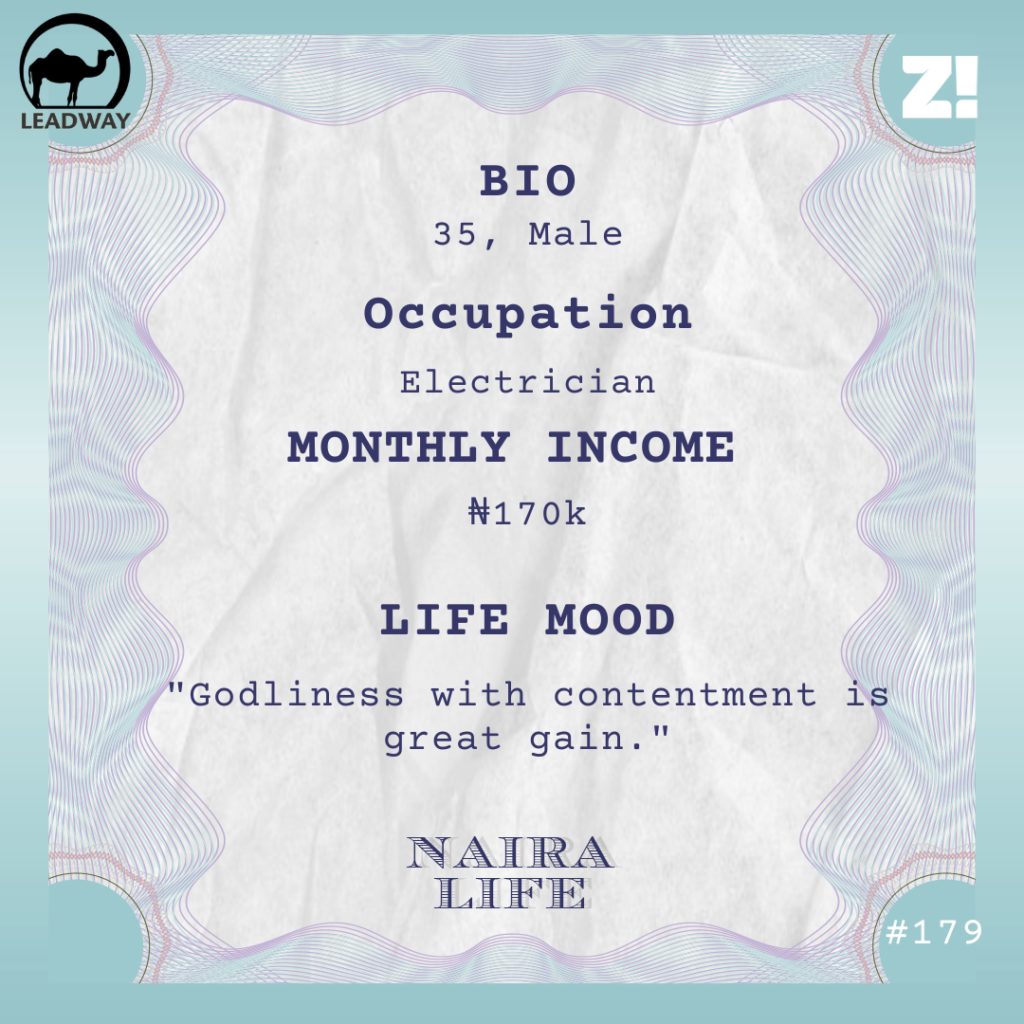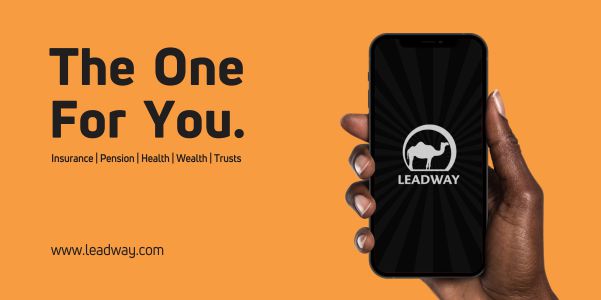Every week, Zikoko seeks to understand how people move the Naira in and out of their lives. Some stories will be struggle-ish, others will be bougie. All the time, it’ll be revealing.
Leadway offers simple insurance products that protect you and everything you care about. From your personal belongings, to your health, your life, and that of your family. Sign up on Leadway Assurance to learn more and get started.
The 35-year-old electrician on today’s #NairaLife worked for eight years after secondary school before he could go to university to study electrical engineering. Now, he has an electronics shop and does contracts on the side, but he wants more.

Tell me your earliest memory of money
I don’t have a specific memory of money from when I was a child. I just know we didn’t have a lot. I grew up in Lagos, my mum sold fruits in bulk to retailers and my dad was a painter. From time to time, I got money to take to school and to buy snacks. That was it.
What was home like?
Not so great, to be honest. My parents were always fighting. They had deep marriage wahala. When I was 10, they separated. Daddy sent me to live with his older brother in Ogun state, and my younger sister stayed with my mum.
How long did you stay there for?
Like five years. I moved there in 1997, so there was no phone to talk to my mum for those five years. In that entire period, I only saw her twice when she came to visit me.
Must’ve been tough
It was. No matter how close you are to the people you’re staying with, they can’t replace your parents. I was always cautious around them, and I couldn’t fully be a child. You can’t just go and lay down on your aunty or hug her like a child would their mum. And when you have stuff to talk about, it can’t be with them. Thankfully, they treated me very well, so that made things a bit more bearable.
Did your dad ever visit?
He didn’t visit; he didn’t send money. Nothing. It was my mum who found ways to consistently send money, foodstuff and clothes through market people travelling through Ogun state.
What did you do when you got back to Lagos?
I moved back with my mum and continued secondary school. Between looking for a new school and writing entrance exams, I eventually finished in 2004. Immediately after, I became an electrician’s apprentice.
Why?
I wanted to study electrical engineering in university. That’s what I’d always wanted since I was a child. I spoilt many appliances at home just because I found a screwdriver and started opening them. I liked seeing what the insides looked like and how they worked; people were already calling me “engineer”.
But my mum didn’t have money to send me to school, so I decided instead of waiting around, I’d just start learning the trade, and when money comes, I’d go to university.
How did that go?
I learnt very fast. By my third month, people in the area already knew I was an electrician, and they’d call me to fix small things in their houses. The first money I made was ₦200 to replace a neighbour’s socket. I was so happy.
How long were you an apprentice for?
I stopped being an apprentice in 2008 and started working on my own. Apart from people calling me to fix stuff in their houses, if bigger electricians had building contracts, they would call me to work with them on site and pay me like ₦2k a day till the work was complete. The money I was making was just enough to survive. Sometimes, when I was dead broke, my mum would give me money.
In 2009, I made my first ₦100k. A deacon in our church, who was also the principal of a school that wanted to set up a computer lab, gave me the project of setting it up. That was my first ever personal contract, and omo, ₦100k was really good money for me. I don’t remember everything I did with the money, but I know I bought a few clothes and some tools for my work.
Was school still in the plans?
Oh yes. After four years of working on my own, I could send myself to school, and that’s what I did. I went to a federal university four hours from Lagos to study electrical engineering from 2012 to 2017. The first few months of school were tough because I’d spent almost all my money — which wasn’t a lot — on fees, moving to school and registration. But after my first semester, I got a house contract that paid me decent money to survive for a few months. After that, I travelled to Lagos every other weekend to service clients. That’s how I survived school.
You already had hands-on knowledge of the stuff you were learning. Was school worth it?
Yes, yes, yes. Knowing the theory of your work is very important o. I even noticed my work as an electrician improved as I progressed in school. If I do some work and someone who just learnt as an apprentice does the same thing, you’d see the difference in quality. Why should I use a thick wire instead of a thin one for this project? As an apprentice, I didn’t know. It was in school I learnt the calculations and justifications.
Did your coursemates know you were an electricia— electrical engineer? Is it electrician or electrical engineer?
They’re the same thing. It depends on who I’m talking to. I can’t go to a big company and say I’m an electrician. They’ll look at me like I’m a joke. I have to say electrical engineer and even mention I studied electrical engineering in school. But in the streets, I’m an electrician. That’s what people want to hear.
And yes, a few of my classmates knew. Just the ones I was close to. It’s not like I was hiding it, but I didn’t do any electrician work on campus, so it only came up in conversations with friends.
What was the plan for after university?
My big plan was, and still is, to have a company where I hire engineers and we write proposals and bid for big electrical projects. But to do that, you need to have money.
I returned to Lagos and continued my electrician work after school. A few months later, I decided to rent an apartment. Since 2009, I’d been switching from living with my mum to living with my pastor. I wanted to be on my own for the first time. So I rented a room and parlour somewhere in Ogun state. I just found out the price — ₦100k per year — and decided to rent it.
Why Ogun state?
It was a new estate where I was called to do the wiring of some of the houses. I could pull together the money to pay for rent, so I thought, “Since this place is just opening up, I’ll be the only electrician here and get a lot of business from residents who might need my services.” I didn’t o. The only business I got was from Lagos, so I had to travel there every week. Sometimes, I travelled to work somewhere, and they gave me ₦2k for my workmanship. It’s that same ₦2k I used to transport myself back home.
My rent was from December 2017 to December 2018. After that, I moved to a tiny self-contain in Lagos that also cost ₦100k a year, and just roughed out 2019. Some contracts here; some site work there.
How do you get contracts?
Recommendations from people I’ve worked for. Site work is different because I’m not the one who gets the job. It’s the electricians who get contracts that contact me to come and work for them. But I stopped doing site work in 2020 when I opened my shop.
Tell me about it
The government was doing a major road repair near where I lived, and people’s houses were being demolished. One man saw his demolished house as an opportunity to create a shop that faced the road, so he said whoever could turn it into a shop could take it.
Without rent?
We arranged that whatever amount I spent on fixing the shop would be taken out of my rent. Then, we agreed on ₦3k a month as rent. I spent about ₦160k fixing the place, so I got the place for over four years.
Mad
In that same period, I got my biggest electrical contract. After paying workers and removing transportation and feeding, I made a profit of ₦400k.
Before that, an uncle in the UK asked what I was doing with my life and if I needed any support from him. I told him I needed ₦500k to set up a shop. He only had ₦100k which he sent. So I added the ₦400k I made from the contract and bought ₦500k worth of electrical appliances like lamp holders, bulbs, sockets and extension boxes.
Did you know how to sell?
No. But I’d been an electrician for years. I could convince customers to choose a product and knew the right terms to use.
I got the shop because I was tired of staying at home, eating and sleeping when I wasn’t on a job. I needed a reason to leave the house in the morning and return at night.
Has the shop been profitable?
Yes! The good thing about electrical goods is they don’t expire. And I can’t make losses because I never sell anything cheaper than the cost price.
How much profit do you make from the shop on an average month?
I’d say about ₦150k a month. But then, if I had to be away for something, the shop would be locked. Now, I have a sales rep who’s always there, so let’s say it brings like ₦160k to ₦170k a month.
And contracts?
They don’t come every month. A small project can make me ₦50k while bigger ones make me between ₦100k and ₦400k. Sometimes, contracts bring profit to my shop because I buy materials from myself.
Do you have any plans to change things in the future?
I want to expand my shop. I want to make it a place where people, even companies, can find anything they want in bulk. When I make solid money from that, I’ll open my company with engineers sending proposals. I’m not considering it now because it’s hard to set up things like that in Nigeria. You need plenty money to pay people to get things in place.
Tell me how you spend money in a month
The rest of the money goes into restocking the business.
No black tax?
Not every month. My mum works and has her own money. It’s only if she needs emergency money she calls me.
And your dad?
He passed away years ago.
What’s one thing you want but can’t afford right now?
Hmmm. A car. Yes, a car. Running around doing all this work without a car is stressful. I carry cables and jump buses and bikes. I definitely want a car.
On a scale of 1-10, how happy are you?
I don’t want to put a number to it. Let’s just say I’m content.
Leadway offers simple insurance products that protect you and everything you care about. From your personal belongings, to your health, your life, and that of your family. Sign up on Leadway Assurance to learn more and get started.





